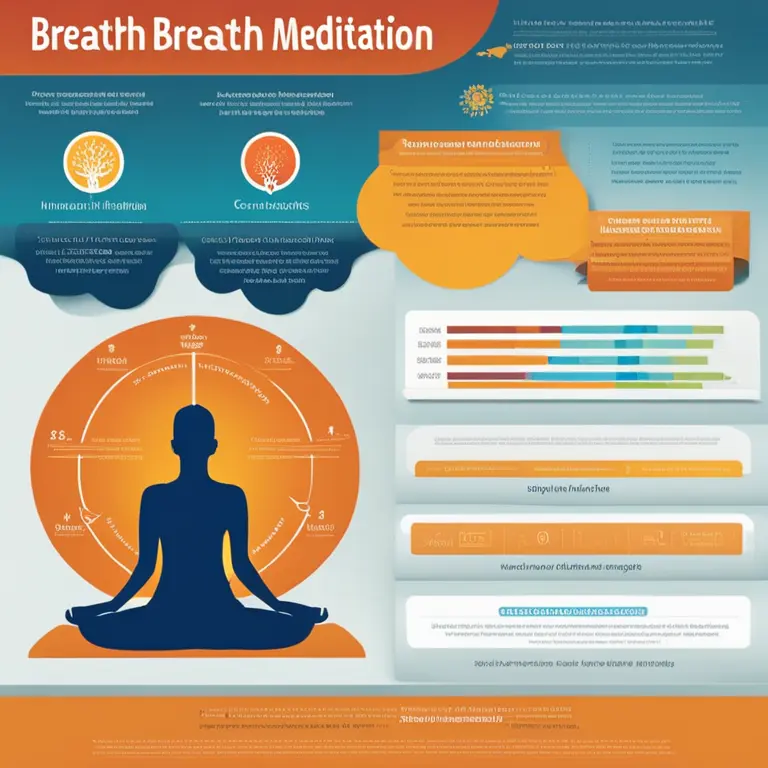
Breath-Centered Meditation: A Mindfulness Practice
Explore the simplicity and power of breath-centered meditation as a tool for achieving mindfulness and inner peace in our constantly connected world.
article by Hina Kurosawa
The Essence of Breath Meditation
In the fast-paced rhythm of the modern era, finding a moment of tranquility can be challenging. Meditation mindfulness of the breath stands as a beacon of simplicity amidst our complex lives. This ancient practice, rooted in various spiritual and secular traditions, is now supported by scientific research as a means to reduce stress, enhance concentration, and promote emotional well-being. As we delve into this meditative practice, we invite you to embrace the gentle cadence of your breathing as a path to mindfulness.

Scientific Backing and Current Trends
Recent scientific studies underscore the profound impact of breath-focused meditation on the human brain. Notably, neuroscientific exploration has revealed that this practice can lead to structural changes in the brain associated with enhanced focus and emotional regulation. In 2024, mindfulness meditation has been widely integrated into mental health strategies across the globe. It's increasingly recommended by healthcare professionals and adopted in educational settings, corporate wellness programs, and even in virtual reality applications.

The Practice: A Step-by-Step Guide
For novices and seasoned practitioners alike, the approach to mindfulness of the breath remains elegantly straightforward. Begin by finding a comfortable and quiet space where you can sit undisturbed. Gently close your eyes and shift your attention to the natural rhythm of your breath. Observe the inhalation and exhalation, the rise and fall of your chest, and the sensation of air passing through your nostrils. The goal is not to alter your breathing pattern, but to witness it with a non-judgmental and present awareness.

Overcoming Common Challenges
Many individuals find that their minds wander during meditation. This is a natural and expected part of the process. Instead of growing frustrated, gently acknowledge the disturbance and refocus on the sensation of breathing. With time and practice, you'll notice the ability to remain present becomes stronger, akin to exercising a muscle. The key is consistency and patience, as the benefits of breath-centered meditation often accumulate subtly over time. Remember, each moment of mindfulness is a success in itself.

Integrating Meditation into Daily Life
The true beauty of meditation mindfulness of the breath lies in its flexibility. While dedicated sessions are beneficial, this form of meditation can also be practiced in short bursts throughout the day. Whether you're commuting, taking a break at work, or waiting in a queue, a few minutes of focused breathing can serve as a potent antidote to stress and a recharge for your mind. As society continues to recognize the value of mindfulness, 'micro-meditations' are becoming an essential tool for maintaining balance in our everyday hustle.
The Ripple Effects on Overall Well-being
As individuals embrace meditation mindfulness of the breath, the ripple effects extend beyond the personal sphere. There's emerging discussion on how collective mindfulness could influence societal dynamics, potentially fostering environments marked by greater empathy, clarity, and cooperation. Similarly, personal relationships can benefit from the increased presence and listening skills that often develop with regular meditation practice. In essence, breath-centered meditation contributes not only to individual peace but also to the weaving of a more mindful society.
Published: 1/18/2024
Modified: 1/18/2024
More predictions
Come back here soon to learn more about yourself and your future


Mastering The Path Of Mindfulness Meditation
Discover the serene path of mindfulness meditation with this comprehensive guide designed to help you find inner peace and clarity.


A Short Guide to Mindfulness Meditation
Embark on a journey of self-awareness and tranquility with this comprehensive guide to mindfulness meditation.


Mindfulness & Meditation: Enhancing Cognitive Flexibility
Discover how mindfulness meditation can foster cognitive flexibility, improving your ability to adapt to new situations and think creatively.